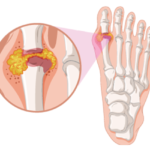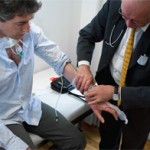
Image Credit: Zoltan Katona; Boris15; Freedom Studio; Neftali/shutterstock.com
It wasn’t until he stepped into a stamp store in Geneva in his teens that Dr. Moeser hit upon a focus for his hobby: Swiss stamps. “I thought it would just be a regular stamp store, but it had incredibly rare items, including one of the first stamps ever for Switzerland,” he explains, referring to the Double Geneva stamp issued in 1843 that could be used as a 10-cent stamp or cut in half and used as two five-cent stamps.
“The person working there was so passionate,” he continues. “I realized stamps are rare and need experts. I ended up giving up worldwide philately to concentrate on one country, so I collect Swiss stamps from before 1900.”
As an adult, Dr. Moeser has channeled his passion for study into not only stamps, but also medicine. “It’s all about study—wanting to learn more about a disease … and take it further,” he says. “That fits my personality.”
Choosing rheumatology as a specialty also spoke to his personal motivation to heal others. “[In] so many professions, it’s hard to find a solution, but I realized that with this one, many times, you can,” says Dr. Moeser, who has practiced rheumatology for 25 years. “When people come to see an internist, it could be for a checkup, but when they come to see us, it’s mostly because they need help with a problem. I like to help alleviate suffering.”
Reading In
Dr. Moeser also makes time during his workday at Arthritis Specialists in St. Peters, Mo., to study rheumatology, often coming into the office two hours before his first patient appointment at 8:30 a.m. to read the latest information about a disease—something as common as rheumatoid arthritis or as rare as Behçet’s syndrome.
“I want to read [about] what’s new with the disease, what’s going on with treatment, what its diagnostic considerations are, [and about] new medications, new tests. It’s important to make that studying commitment. [Rheumatology] should be more than just reading a book and passing boards, but … knowing the latest and greatest for the patient.”
‘When people come to see an internist, it could be for a checkup, but when they come to see us, it’s mostly because they need help with a problem. I like to help alleviate suffering.’ —Dr. Pierre Moeser
Patients Come First
Staying current and knowledgeable about various rheumatic conditions and treatments helps Dr. Moeser tailor office visits to each patient’s distinct needs. That includes such aspects as injections and refills. He also makes it a point to consider their finances, level of understanding and personal desires.
The phone is also vital. “I make sure all calls are answered before my lunch; if my staff is out to lunch, and a patient called with a question, then I won’t eat before calling them myself. It’s a short lunch, anyway, since I’m also looking at labs and X-rays.” Moeser says patients appreciate the quick return call on their concerns.
“I’m trying to assess if the patient has a good understanding of the disease, because arthritis is not a disease—there are 120 different musculoskeletal conditions to consider,” he notes. If a patient has been diagnosed, do they know what the illness is? “If not, then I give them a basic, but thorough explanation of what they have. We’re trying to match treatment to their finances, understanding and personal desires, and adhering to medical ethics throughout. I make sure they know—through my actions or words—‘If you have a problem, we have a problem.’ I don’t just give them a prescription and send them on their way. It’s about a commitment to helping, and that’s right down to my staff.”
Service
Dr. Moeser says he aims to bring the same outstanding level of service to rheumatology patients that he enjoyed years ago at the Geneva stamp shop where he discovered an affinity for Swiss stamp collecting. Although Dr. Moeser has allowed his philately interest to share time with other interests, including flying, he recalls that day in Switzerland for more than just the unusual stamps:
“I remember the guy in there handing me a magnifying glass and taking the time to explain,” he says. “I was only a teenager, but I really appreciated how he took me seriously.”
The proprietor respected his customer and spent time with him—it’s not hard to see how Dr. Moeser would relate to that philosophy.
Eric Butterman is a Texas-based freelance writer. Contact him via email at [email protected].


